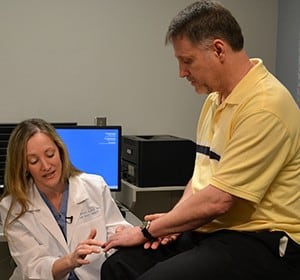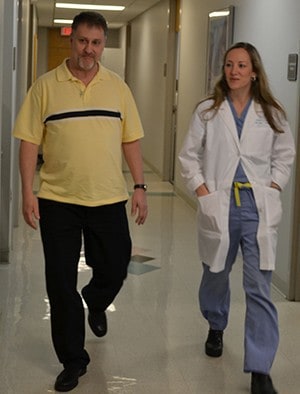Hand Telemedicine Program, UAMS Physician Save Batesville Man’s Hand
| May 11, 2015 | A split-second connection between a table saw blade and a wedding ring almost took Tommy Watts’ hand.
When the teeth of the blade caught on the ring, it pulled Watts’ hand into its path, slicing into his left hand and almost severing two fingers. He wrapped his hand in a

Theresa Wyrick, M.D., examines Tommy Watts’ left hand. Surgery performed by Wyrick helped save two of his fingers after an accident severely injured them.A high-speed, split-second video connection between a Batesville hospital and UAMS orthopaedic surgeon’s iPad helped him keep it
towel and called out to his wife, Shelley, for help.
She drove him to the Batesville hospital where a physician and nurses in its Emergency Department decided to seek a telemedicine consultation with a specialist in hand surgery, Theresa Wyrick, M.D., associate professor in the UAMS College of Medicine’s Department of Orthopaedic Surgery.
Wyrick and six other Arkansas physicians provide on-call consultations 24/7 every day of the year through the Hand Trauma Telemedicine Program. Patients and their physicians in 72 hospitals throughout Arkansas can link up in real time with hand trauma surgeons and specialists via a high-definition broadband video connection provided through e-Link Arkansas.
Curtis Lowery, M.D., founder of the UAMS Center for Distance Health, said telemedicine enables one specialist to be on call for the entire state, freeing up others who might otherwise be on call more frequently and for a limited area. The use of the iPad means physicians who are on call are free to travel or be anywhere they can connect to the Internet.
“It’s a game-changing technology for health care,” Lowery said.
In Watts’ case, the Batesville hospital prepared a telemedicine cart equipped with a camera and monitor that connectedthrough the Internet to Wyrick’s iPad in Little Rock. Through the iPad, Wyrick was able to examine Watts and talk to him and make the recommendation that he be transferred to UAMS for surgery.
Timely surgery is especially crucial in hand trauma cases. Wyrick estimated the telemedicine consult saved at least two to three hours of time between his accident and transfer to UAMS.
“I knew it was bad,” Watts said. “I didn’t know how bad. When it first happened, it didn’t hurt. Once it was wrapped in the towel, the throbbing kicked in. I kept pressure
on it and kept it up high. The ER started IVs, gave me medicine and shots in my hand. The worst part of it all was lying there wondering if I was going to still have a hand once it was over.”
Being able to see Wyrick, through even a video connection, was reassuring to Watts.
“She gave me hope,” Watts said. “She was like an angel. I was wondering what was going to happen. She was confident and sounded
confident. She told me exactly what I needed to do. I felt like there was hope. When we got here and met her team, they took images and the next thing I knew they had me in surgery. I’m blessed to have had Dr. Wyrick. I am forever grateful.”
On Wyrick’s end, the ability to examine the hand visually and talk to Watts meant being able to prepare for his transfer and arrival — getting the right instruments set up for surgery and briefing operating room nurses and staff.
“That way when the patient hits the door, we’re ready to go,” Wyrick said. “It’s much more efficient and gives them that hope early in the process. There’s a lot of anxiety surrounding the possible loss of a finger or hand. So, with this network, we’re able earlier to say, ‘We can work on this. Come to Little Rock. There are things we can do to save your hand.’”
Watts was able to keep his fingers and hand. Although the dexterity in his left hand has not fully returned to what it was before the accident, the physical therapy and possible follow-up surgery promise to restore even more range of motion to his fingers.
As with Watts, the Hand Telemedicine Program has helped more than 250 hand trauma patients since its beginning inJanuary 2014.
“Hand trauma, with Arkansas being an agricultural state but also with numerous factories, happens often in the course of work,” said Terri Imus, R.N., trauma telemedicine coordinator at the UAMS Center for Distance Health. “Arkansas has a limited supply of hand surgeons in a limited number of cities throughout the state.
The program extends that expertise statewide.”

